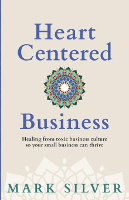
Image from Pixabay
The journey you’re on with your business is a relationship: a relationship with your own heart, with your business, with the world. Therefore, the quality of that journey, and where you end up, is going to be largely defined by the quality of the relationships you have with each of those.
On May 29, 1999, I was staying the night with my friends Oren and Irwin, a couple who hosted me in their apartment in the Haight district of San Francisco. It was the night before the commitment ceremony between my wife Holly and me. In the Jewish tradition, the two who are to be married aren’t supposed to see each other before they meet under the huppah, the wedding canopy.
Permission to Re-Evaluate
I don’t know how or why I had the courage to do this, but I went from my friends’ apartment down to Ocean Beach and walked there for some time. Up until then, I had always lived my life mostly by other people’s expectations. But on that night, I gave myself permission to back out, even though family had flown in and a great deal had been put into the whole thing. But it felt like too big a commitment for me to go through with just because of all that.
In a fumbling way, I spent time in my heart, remembering the previous five years of relationship we’d had together. How we’d worked through challenges, and how we enjoyed each other. I was able to commit to the journey with her, wholeheartedly, and come back relaxed and in myself, knowing I wasn’t doing this for anyone else but the two of us.
I want you to feel that same sense of permission with your business. I don’t want you committing to your business because you’re desperate and think there’s no other option. I don’t want you committing to it because it’s cool, or “it has potential,” or anything like that. And I definitely don’t want you to make an unconscious commitment, by just being on autopilot and continuing on the path.
What Lies Ahead?
There is no way for you to truly know what lies ahead for your business, just like I had no idea of all that would occur in Holly and I’s life together from 1999 until now (September 2022 as I write this). I am joyfully committed not to an outcome but to the relationship—and to the journey. And gratefully, it’s been a fantastic one.
This is not to say all relationships last this long. Some end in divorce much earlier. A client of mine is a lawyer who practices compassionate divorce and mediation. There is a way to end a journey with love and care, without struggle and fighting.
There may come a time when it becomes obvious that it’s okay to part ways with your business. This commitment is not one that requires you to stick with it until you die.
However, it is a conscious commitment. You know the work. You know the terrain you’ll be traveling. You know what is being asked of you.
This is the commitment you should make consciously, so you can settle in and really go for it. Or not.
The Grief of Commitment: Letting Go
Making a commitment means making space for that commitment. Taking on anything or anyone new and significant means accepting that it’s going to take up time and capacity in your life. You need to let go of things to make room.
This can be challenging to face because prioritizing and letting go is more difficult than you might think.
Lots of smart people talk about prioritization in terms of letting go of unimportant or trivial commitments to make room for better ones. For example, giving up mindless scrolling on social media to take on something life-affirming, like gardening.
What gets talked about much less is this: human capacity is so limited that taking on a new commitment means letting go of other significant, meaningful commitments. There are things in your life that are important and worthy of care and attention. Nevertheless, some need to be set aside, at least for a time, in order to give attention to what you are called in your heart to prioritize.
Letting Go of Commmitments Can Be Painful
It will be painful to let go of commitments you care about. Because of this, no matter how excited and enlivened and clear you are about your commitment, there is also going to be grief. Sometimes it’s tiny, and sometimes it’s surprisingly significant.
There is little space set aside for grief in our culture— especially in my country, here in the United States. Even catastrophic grief, like the loss of a parent or child, is often not given much time or space.
When one thinks about other griefs—like the grief of being ill for an extended period, or the death of a pet, or the breaking of a beloved mug—do we allow ourselves to grieve? If so, are we supported in that grieving process?
In fact, the lack of ability to process grief can often be a major contributor to stress, anxiety, and the inability to follow through.
Making Space for Grief in Your Life
I encourage you to make more space for grief in your life than feels even reasonable. It will help you move forward in surprising ways. It will heal you.
In 2015 we moved from Portland, Oregon, to an eco-village in Danby, New York. Intentional community had been a multidecade dream of ours. We sold our house and committed to this new community we joined. It was wonderful for five years.
Through no issue with the community itself, we discovered that our life wasn’t working for us. There are too many reasons, and they are too personal, to share here, but suffice it to say that we went through a tremendous grieving process leaving the ecovillage and moving to central Pennsylvania.
The grieving process was hard. Many tears were shed, and I felt the loss keenly. Until it really worked its way through my heart and being, it was hard to feel my feet on the ground here in central Pennsylvania. As the grieving has crested and ebbed, space has opened within me for deepening relationships and community where we live now.
My invitation to make open space to grieve includes grieving any commitments you might let go of in order to take on the commitment to your business. Or, conversely, if you get clear in your heart that you aren’t going to make a commitment to your business, that will be a grief, too, since you have probably cherished dreams about it.
And yes, even deferment is worth grieving. Pain comes even when a commitment isn’t being abandoned, just set aside for a future time. The loss of it from your present life is a real loss worth grieving.
Things to Be Aware of
-
A commitment to relationships is the healthy alternative to the dysfunctional commitment to outcomes that is often asked for. We cannot know how things will turn out, so the only reasonable commitment is to a relationship, not to the results.
-
Your business does not have an ego, so it cannot feel abandoned, lonely, resentful, or other human emotions. Communicating with the heart of your business is another way of receiving from the Divine, the Source of love.
-
Making a commitment involves grief, because there are things worthy of care and attention that may need to be set aside temporarily or permanently so you can follow what is true in your heart. The grief is real and worthy of your attention.
-
Your business is asking for a very different commitment than what the culture says one must commit to a business.
Copyright 2023. All Rights Reserved.
Adapted with permission of the publisher,
Wildhouse Publications, an imprint of Wildhouse Publishing.
Article Source:
BOOK: Heart Centered Business
Heart-Centered Business: Healing from toxic business culture so your small business can thrive
by Mark Silver
 In Heart-Centered Business, spiritual business teacher Mark Silver, M.Div. speaks to those who want an approach to business that is as nourishing as it is powerful. The effects of global business have brought devastation and injustice to the world. Yet we yearn for beauty and real vibrancy in the world around us, and healthy heart-centered business must be part of the healing. This book is a guide to doing business, your business, in a truly spirit-centered way. We need to, and can, realize the truth that every act of business can be an act of love.
In Heart-Centered Business, spiritual business teacher Mark Silver, M.Div. speaks to those who want an approach to business that is as nourishing as it is powerful. The effects of global business have brought devastation and injustice to the world. Yet we yearn for beauty and real vibrancy in the world around us, and healthy heart-centered business must be part of the healing. This book is a guide to doing business, your business, in a truly spirit-centered way. We need to, and can, realize the truth that every act of business can be an act of love.
For more info and/or to order this book, click here. Also available as a Kindle edition.
About the Author
 Mark Silver is a fourth-generation entrepreneur who has run a distribution business, turned around a struggling non-profit magazine, and worked as a paramedic in the San Francisco Bay Area. The founder of Heart of Business in 2001, Mark is the author of the book, Heart-Centered Business.
Mark Silver is a fourth-generation entrepreneur who has run a distribution business, turned around a struggling non-profit magazine, and worked as a paramedic in the San Francisco Bay Area. The founder of Heart of Business in 2001, Mark is the author of the book, Heart-Centered Business.
A designated Master Teacher (“muqaddam murrabi“) within the Shaddhilliyya Sufi lineage, he has received his Masters of Divinity with a speciality in Ministry and Sufi Studies. As a coach, consultant, mentor and spiritual healer, he has worked with over 4000 businesses since 1999, facilitating thousands of individual sessions with entrepreneurs and has led hundreds of classes, seminars, groups and retreats.
Visit his website at HeartOfBusiness.com
























